What is a country to do if its economy suddenly takes a nosedive? What if the country’s sole source of income is a product that’s suddenly no more in demand? Are economic reforms in order? Or a smart political move?
No; I’m not talking a 1950s tale of courage and enterprise in the face of economic disaster (not in the way one would’ve expected, at any rate). Not when you know that the star of this film—in a triple role, too, one of which is a woman—is the inimitable Peter Sellers. And not when you know that it revolves around a fictitious country, supposedly the smallest in the world, which decides that what its economy needs for a turnaround is to declare war on the United States of America.
 The Mouse That Roared begins with a brief and hilarious introduction to the Independent Duchy of Grand Fenwick, 15 ¾ square miles of nation tucked away in the French Alps, and founded in the late 14th century by an English knight named Fenwick, who happened to like this little stretch of land enough to settle down here. Grand Fenwick, we are told, is therefore the only English-speaking nation on mainland Europe, and it’s ruled by Her Highness, the Grand Duchess Gloriana XII (Peter Sellers), a sweet, vague and motherly lady still mourning wistfully for her long-dead husband.
The Mouse That Roared begins with a brief and hilarious introduction to the Independent Duchy of Grand Fenwick, 15 ¾ square miles of nation tucked away in the French Alps, and founded in the late 14th century by an English knight named Fenwick, who happened to like this little stretch of land enough to settle down here. Grand Fenwick, we are told, is therefore the only English-speaking nation on mainland Europe, and it’s ruled by Her Highness, the Grand Duchess Gloriana XII (Peter Sellers), a sweet, vague and motherly lady still mourning wistfully for her long-dead husband.

Grand Fenwick’s main product all these years has been a wine: Pinot Grand Fenwick, the result of a small (very small) industry.
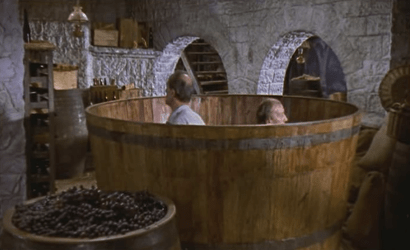
For some unfathomable reason, the US has been a big market for this wine, and that’s where all of Grand Fenwick’s money comes from.
… but now, in 1959, disaster has suddenly struck Pinot Grand Fenwick, and, consequently, Grand Fenwick itself. Some upstart Californian vineyard has started producing what it sells as Pinot Grand Enwick.

The demand for Pinot Grand Fenwick has plummeted, and Grand Duchess Gloriana and her advisers are in a flap. What are they to do? With wine exports down to zero, poor Grand Fenwick isn’t merely looking at bankruptcy: it is bankrupt. “As of today, we are living on petty cash,” says the Prime Minister, Sir Rupert of Mountjoy (‘Bobo’, as Lady Gloriana addresses him; also Peter Sellers).
Thankfully for Grand Fenwick, Bobo has a brilliant idea. Attack the US. Declare war on them. “There isn’t a more profitable undertaking for any country than to declare a war on the United States and to be defeated,” he says.
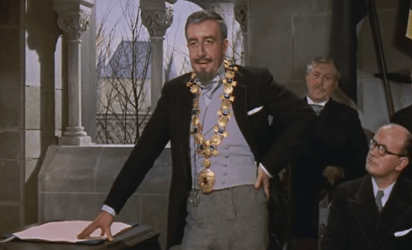
After all, look at America’s past record in matters of war: every time the US has defeated another country, the aftermath has been a shower of bounty for the country in question. The Americans, says Bobo, are a strange lot; where other nations would decimate the enemy, the Americans end up pumping millions of dollars into it. If Grand Fenwick does this the right way, they can be laughing all the way to the bank.
It must all be done according to the rules, of course. Which is to say, a declaration of war must first be sent to the US. This must then be followed by an invasion.
An invasion? Who’s to handle that?
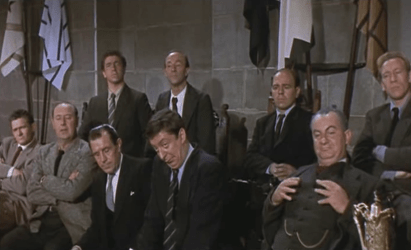
Why, Tully Bascombe, of course. Tully (Peter Sellers again) is not just Grand Fenwick’s game warden, he also holds the hereditary post of Field Marshal and Grand Constable of Grand Fenwick’s twenty-man strong army. Bobo proposes that Tully lead Grand Fenwick’s army to New York City, where (naturally, Grand Fenwick and the US being at war) these intruders will immediately be arrested. This will officially mean that Grand Fenwick has been defeated, and then all the little country needs to do is prepare to greet the GIs who will come marching in to occupy Grand Fenwick and bring in truckloads of delicious dollars.

There are some hitches, though. A member of Grand Fenwick’s opposition party pooh-poohs the idea of Tully leading the army. He’s got “fallen arches, flat feet, sinus, migraine, claustrophobia and high blood pressure. Apart from being near-sighted and getting dizzy in high places”. We also discover, later on, that Tully gets seasick. Even in rowboats.
Not a very bright prospect, it seems, as commander of an invading army.
Bobo, however, squelches the opposition. Will Buckley (William Hartnell), who used to be a sergeant with the British army in the last war, will go along and be Tully’s second in command. They will pull this off.

So, a letter—declaring war—is mailed to the US. (Bobo and his lot are not to know that it gets consigned to the dustbin on arrival, because it seems so absolutely preposterous; it’s dismissed as a prank).
And Tully and his men (who’ve had to be ordered by Will Buckley to ‘volunteer’) set off, clad in their traditional uniforms (chain mail) and carrying their traditional weapons (bows and arrows). They are given a grand send-off by their fellow countrymen (and women), and stop only long enough behind a hedge to change into more everyday modern clothing before boarding a bus to Marseilles.
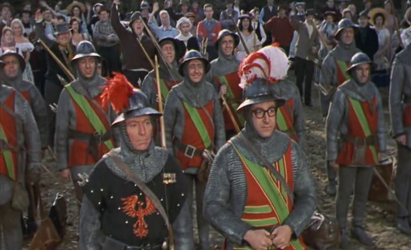
At Marseilles, the troop hires a small (but belligerent) little ship to carry them across the ocean to America.
Little does this little bunch of Grand Fenwickians know that, on the day they’ll be arriving in NYC, the brilliant scientist, Dr Alfred Kokintz (David Kossoff) will be conducting some critical experiments on his invention, the Q-bomb. The Q-bomb, we discover, will make the H-bomb look like a firecracker, and has the potential to wipe out all of North America—and parts of South America, too—in one fell swoop.
While Dr Kokintz carries out his experiments at the New York Institute of Advanced Physics, for the safety of New Yorkers, the government has declared an air raid drill, a complete shutdown of the city. Everybody must be underground in the designated shelters until the all-clear.
Which means, of course, that when Tully Bascombe, Will Buckley and their entourage sail into the harbour, it’s to find New York completely deserted. There isn’t a soul to be seen.
How puzzling.
Our conquering heroes wander around, trying to figure out what’s wrong. Has all of New York gone into hiding?

Fortunately, a newspaper which they find lying around provides the answer. So it’s an air raid drill, and because of this scary bomb. All right. But whom will they surrender to? They’ve been given instructions, by Bobo, that they’re to surrender to the American forces—but there aren’t any Americans to be seen here.
One of Tully’s men offers their invasion map (a guide book to New York), and they quickly check the address of the arsenal. They’ll go there and surrender. Easy-peasy. This way, through Central Park…
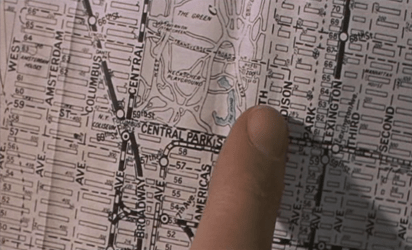
En route, they find an abandoned vehicle—a decontamination squad’s van—and are busy examining it when the two-man squad (which had gone off for a loo break) returns. The decontamination squad are dressed in their protective gear, and Tully and Co. are dressed in their medieval chain mail, as a result of which both parties mistake the other for men from Mars. A small skirmish breaks out, and Tully’s men succeed in dispatching several arrows at the ‘aliens’ before Will Buckley stops them.

The decontamination squad men, thanking their stars for a lucky escape, make a frantic phone call, announcing the arrival of the men from Mars, and soon it’s on the radio news. All of New York, down in the bomb shelters, begins to buzz with the news.
Meanwhile, Tully being what he is, manages to get his army lost: they turn up at the New York Institute of Advanced Physics instead of at the arsenal.
This may be fortuitous, though. Tully remembers the newspaper: wasn’t this where Dr Kokintz is building the Q-bomb? So, before anybody can come along to stop them, Tully enters and finds Dr Kokintz’s lab, where Dr Kokintz and his daughter Helen (Jean Seberg) are at work.

And before Dr Kokintz and Helen quite know what’s happening, Tully—in a spirited and unexpected show of initiative—has taken them, and the ominously ticking bomb (which looks rather like a football) hostage. Another few minutes, and they’ve been bundled into the decontamination squad van (which the Grand Fenwickians had commandeered). The little army heads for the docks, ready to go back home triumphantly to Grand Fenwick.

On the way, there’s another happy surprise waiting for our men. A high-ranking American army officer, General Snippet (MacDonald Parke) has been deputed to get to the bottom of this ‘men from Mars’ rumour, and is out in a jeep with four NYPD cops, looking for evidence, when they run into Tully and Co. There’s a short, sharp, one-sided battle, with General Snippet and the four policemen being taken prisoner within moments.

They’ve done it, says Tully, well pleased. They’ve got the bomb, Dr Kokintz, Helen, the general and the cops. Nobody’s stopped them. So they hoist the national flag of Grand Fenwick on the customs house shed, and take the boat home.
…where Bobo, his colleagues, and all of Grand Fenwick are busy preparing for the arrival of the GIs, and drawing up lists of things they need (malted milk machines for one, hot dogs for another). Little do they know that Tully Bascombe has, in effect, won Grand Fenwick’s war with the US and Grand Fenwick has bitten off far more than it can hope to chew.
Or has it? This hilarious farce still has many twists and turns to come.
Written by the Irish-American writer, Leonard Wibberley, The Mouse That Roared was a Cold War satirical novel released in 1955. This film, directed by Jack Arnold, was the first media adaptation of the novel, though it’s since been also adapted for television, radio, and the stage.
What I liked about this film:
The superb satire of it. On the surface, The Mouse That Roared is an often-ridiculous (Peter Sellers as Gloriana XII?!), often plain old loony tale about a nutty adventure that takes an unexpected turn. It’s hilarious, true, but there’s a wry comment on international politics and diplomacy here. Not just in Bobo’s very canny remark about the US’s ways of dealings with defeated enemies (Bienvenido, Mr Marshall!, anyone?), but in the way the story later plays out. The film becomes an interesting—even if in a farcical way—comment on how nations struggle for power, and the different forms power can take.
The Mouse That Roared was written at a time when the Cold War loomed over the world and nuclear proliferation seemed (was?) uncontrolled. These form the actual warp and weft of the story: what if one country held the power to destroy much of the rest of the world? How would it change world politics? How would it effect diplomacy? Are the two sides of the Iron Curtain really that much different? What really matters in life—personal and political, individual and national?
All, of course, in an utterly loony tale that had me chuckling through much of it. The dialogues are often hilarious; the situations are funny, and Peter Sellers, in particular, is brilliant. In all three roles.
What I didn’t like:
Not much, really. There is the occasional episode that’s stretched a bit thin (the ‘men from Mars’ rumour that sweeps over New York is one example), but other than that, this is a delightful film, a must-watch for anybody who likes a good laugh.

What a delightful review of what seems to be a delightful film – I hate to confess this but I’ve never even heard of this film before! And I love Sellers. Thank you, Madhu.
*scurries off to look for this film*
LikeLike
I don’t even remember now how I first came across this film – I think IMDB threw it up as a recommendation for some other film I was checking out. Reading the synopsis, I was so intrigued, I went searching for it. And was glad I bothered! It’s hilarious. Corny in places, but overall pretty good. Give it a try, Anu.
By the way, I found that it’s on Youtube, with ‘Venetian’ (I guess Italian) subtitles. If the text doesn’t seem too intrusive to you, you can watch it. It’s in various parts; the first is here:
LikeLike
This sounds like a delightful movie, from your review. I would love to watch it, but first, I must find it. In the meantime, thanks for telling us about a movie that I had not heard of until today.
LikeLike
It is a delightful film, Lalitha. :-) In my response to Anu, I’ve posted the link to the first part of the film, which someone’s uploaded on Youtube. Have a go at it – it’s loads of fun.
LikeLike
I read only till “… to change into more everyday modern clothing before boarding a bus to Marseilles.”. Not because it was boring or anything. I was roaring with laughter. I just have to see this movie. Thanks for the link and recommendation.
I think it is making fun of the Marshall Plan a bit, isn’t it? Not criticising it, I presume, but making a good-humoured dig at it.
LikeLike
Oh, yes. You really must see the film, Harvey. It’s utterly delightful. And I agree, too, that it pokes fun at the Marshall Plan. Among various other issues, such as the arms race and international diplomacy… it’s uncanny, how so much of what this film is about is still relevant, in some or the other. The world doesn’t change that much.
LikeLike
Unfortunately, the link on youtube doesn’t provide all the parts of the film, but the parts, which I could watch, makes me want more.
LikeLike
Yes. :-( Venkataramanji mentioned that he wasn’t able to find all the parts on Youtube. Sorry about that.
LikeLike
Madhuji,
Seems to be an interesting political satire, and an equally interesting review. Thanks.
Intend to watch the movie. But I could not find the complete version in YT Even I could not get all the parts that you have mentioned.
Reminds me of another PeterSellers movie, Being there.
LikeLike
Oh, I’m so sorry, Venkataramanji! I only checked that the first part of the movie is available on Youtube and that it did have the original soundtrack; I didn’t see if the rest of the parts were there too. I will have a look and see again if I can find the entire movie somewhere. It’s worth a watch.
LikeLike
Madhji,
I once again tried to locate a copy of this film. No Luck. I managed to see the movie in bits and pieces. About 20 minutes in several parts. And another 50 minutes capsule. Will try to get a copy from the local library or store for this weekend viewing.
As regards multiple roles played by an actor, I think Shivaji Ganeshan did 9 or 10 roles in a Tamil film, Navaratri. Sanjeev Kumar repeated the roles in the Hindi version Main woh nahi. From whatever I managed to watch, Peter Sellers was good in all three roles, especially the role of the Grand Duchess Gloriana and Sir Rupert of Mountjoy.
LikeLike
Oh, yes. I remember Sanjeev Kumar playing nine roles – each representing one of the nine rasas, but I seem to recall the name of the movie as Naya Din Nayi Raat. Jaya Bhaduri was the heroine.
I do hope you’re able to find the complete The Mouse That Roared. I agree that Sellers is especially good as the Duchess and Bobo; Tully Bascombe is a somewhat insipid character in contrast.
LikeLike
Yes you are right.I got the name of the film wrong. Woh Main nahin was the remake of the Tamil film Naan Avan Illai, which was again a adapted from the Marathi play To me navhecch.
Thanks
LikeLike
Thank you, Venkataramanji.
LikeLike
I am not much of a Peter Sellers fan, actually I haven’t seen too many of his films, so I guess I shouldn’t be forming an opinion about him. Besides that I am always wary of films where the lead actor plays more than two roles, usually I have found the overdose of one actor quite boring, There was one film though which I saw in my childhood and that was Jerry Lewis in seven roles in ‘Seven Jewels’ and I just enjoyed it but then I was a child , I do not know whether I would enjoy it now. However after reading your review I think I should get rid of my misgivings and see the film. I quite liked the story, it sounds promising.So this film too goes into my ‘To Watch’ list.
LikeLike
I haven’t seen Seven Jewels, but Jerry Lewis is one actor I’m not too fond of! (Of course, to be honest, I’ve only seen him in the films he did with Dean Martin, and all of them were pretty cookie-cutter type: he acted the buffoon in them all). I suppose if I’d seen them as a child, I’d have liked them too, but I saw these just a few years back, and they irritated me.
Peter Sellers’s movies tend to be either hilarious or painful, in my opinion. I like some of the Pink Panther series (A Shot in The Dark is lots of fun, for example). But I remember seeing – when I was a child – something called The Waltz of the Toreadors, which was quite terrible.
Talking about multiple roles, I think it all depends upon the actor and the characters portrayed. For instance, I found Mehmood’s triple role in Humjoli very irritating, but IS Johar’s triple role in Johnny Mera Naam was funny. Where Peter Sellers’s triple role in this film works is that these three characters are very different from each other, and Sellers plays them all convincingly.
LikeLike
Yes I agree Johar was funny in Johny Mera Naam.
LikeLike
Madhu, thanks so much for reviewing this favourite of mine. As usual a delight to read. Enough said :)
LikeLike
Ah, I’m so glad to find someone who has seen this film! Good, good. A favourite of mine, too, as you can see. :-)
LikeLike